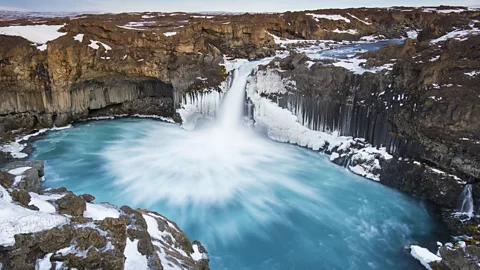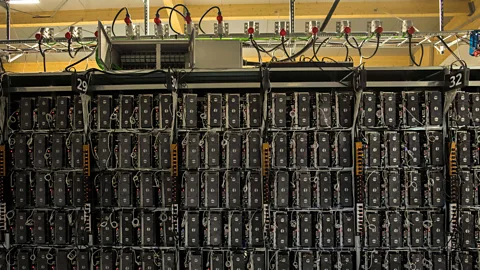The unlikely nation filled with cryptocurrency mines
 Getty Images
Getty ImagesWhat happens when cryptocurrency miners take over your town?
This story is from Business Daily on BBC World Service. It was produced and presented by Edwin Lane. To listen to more episodes of Business Daily, please click here. Adapted by SJ Velasquez.
Mining for virtual currencies has become big business, but what happens when the miners set up shop in your town?
There are hundreds of types of cryptocurrencies, and values for some have skyrocketed in the last three years. A single Bitcoin, for example, is now worth more than $7,000, when it was worth just a few hundred dollars as recently as 2016 – and that’s made the business of creating new cryptocurrency potentially very lucrative.
Coming up with new crypto units involves using computing power on an industrial scale to solve complex algorithms. The process is called “mining”, and it’s supposed to ensure that making new units of cryptocurrency is difficult and limit the supply. But in the last few years, companies have been establishing vast cryptocurrency “mines”, stacking up hundreds of computers under one roof to create the digital currency much faster. These data centres consume massive amounts of real-world electricity.
And recently, a number of mines have been popping in one unlikely country: Iceland.
 Getty Images
Getty ImagesAmid dozens of warehouses in a seeming wasteland, a nondescript shed houses one of these operations – a cryptocurrency mine. Standing in what was once a car service facility on a US military base near Reykjavik, Arni Jensen from the Borealis Data Center explains how the building has been transformed into a cryptocurrency mine complete with racks of computers and hanging wires.
“These are what’s called graphical processing rigs,” Jensen says. “We take the card inside your computer that makes the screen come alive, and we stack a number of these cards – 10 or 15 – into a frame. What they allow us to do is parallel process, so they can do these algorithms that we are running in parallel.”
So, why Iceland? The computers heat up and need to be kept cool, which can be an expensive task to manage. Lucky for Iceland, it's well equipped to handle this problem. Jensen says there’s no need to install cooling units because of Iceland’s naturally cool climate that regulates the mines’ internal heat from the outside. This means it's not necessary to spend money to cool the computers.
Just the process of running the computers also requires loads of energy. Iceland, however, has an almost limitless supply of energy under its soil. The small country boasts a number of geothermal power plants that use the steam from naturally super-hot geothermal water to power turbines to create huge amounts of cheap energy.
“By the end of this year, data centres in Iceland will use more electricity than all the homes in Iceland combined,” says Johann Sigurbergsson from the geothermal energy company HS Orka.
 Getty Images
Getty ImagesWhat this means is that, so far, the cryptocurrency mines aren’t creating many problems for Iceland, a country that draws 100% of its energy supply from renewable sources.
But in Plattsburgh, New York, it’s a different story. The presence of mines is putting so much financial pressure on the city that the mayor has announced a temporary ban on cryptocurrency mining.
“Right now, they’re already using upwards of 15 to 25% of our power in the city on a given day. Not only do they use an incredible amount of power, but there’s an awful lot of unintended consequences that have never been dealt with,” says Plattsburgh mayor Colin Read, who added that the computers also produce an incredible amount of noise and heat.
For Plattsburgh, the negatives outweigh the positives. Because the mines are essentially automated, they employ very few people. Also, because of the transient nature of the cryptocurrency business, owners of the companies tend to lease facilities rather than own, so the city does not benefit from property taxes.
“I’m a big fan of cryptocurrency,” Read says, but Plattsburgh needs to figure out how to address the problems it’s currently facing with regard to cryptocurrency mining before lifting the ban and welcoming miners back into the city.
--
To comment on this story or anything else you have seen on BBC Capital, please head over to our Facebook page or message us on Twitter.
If you liked this story, sign up for the weekly bbc.com features newsletter called "If You Only Read 6 Things This Week". A handpicked selection of stories from BBC Future, Culture, Capital and Travel, delivered to your inbox every Friday.
